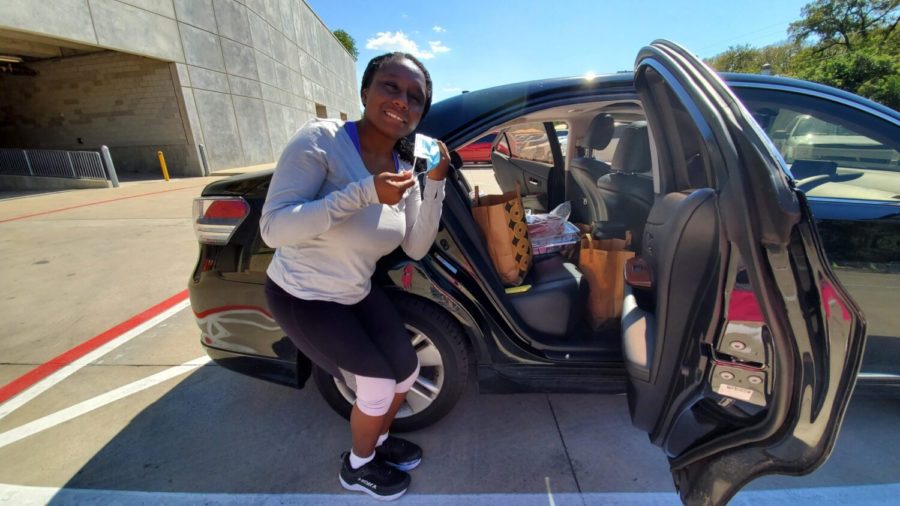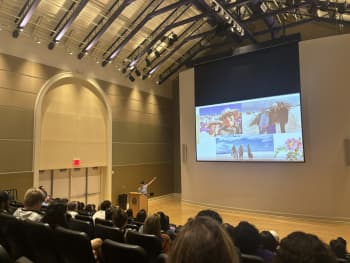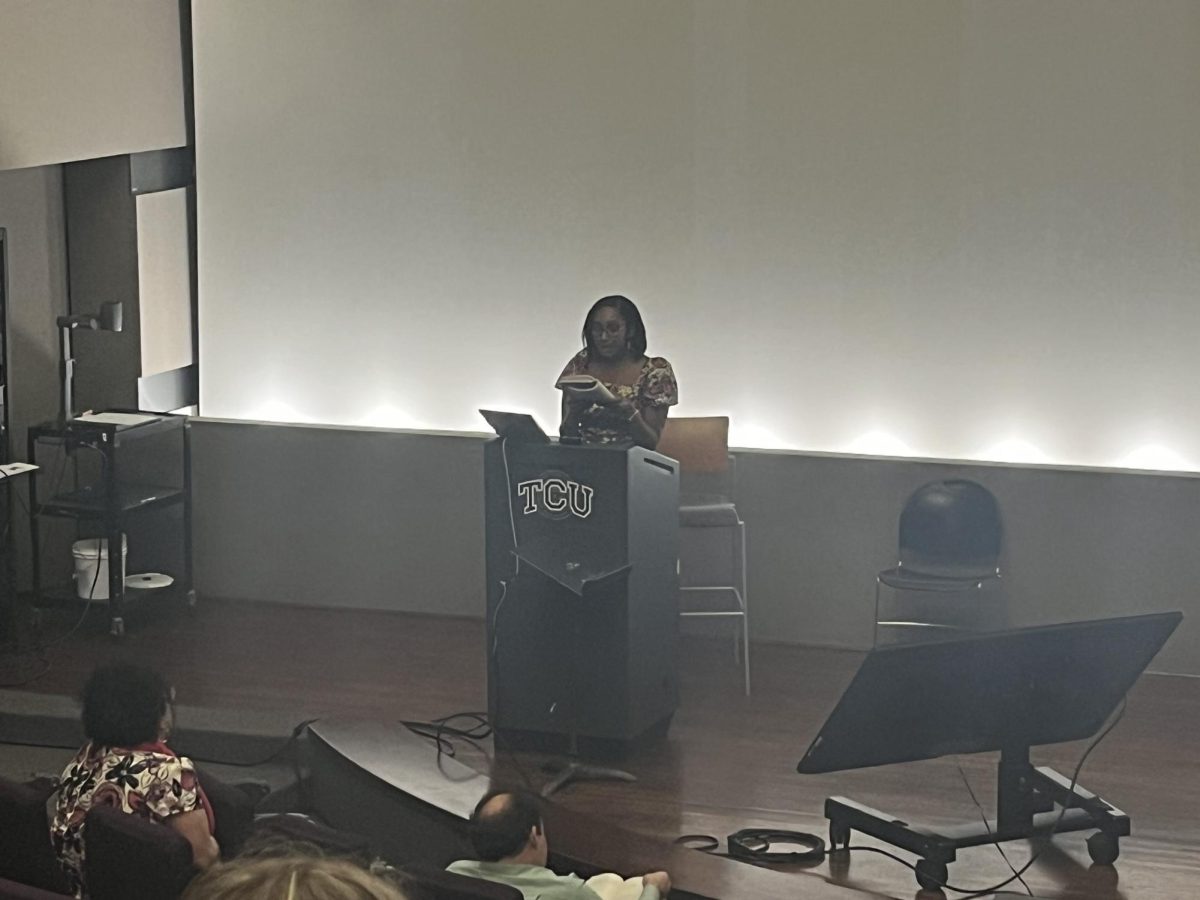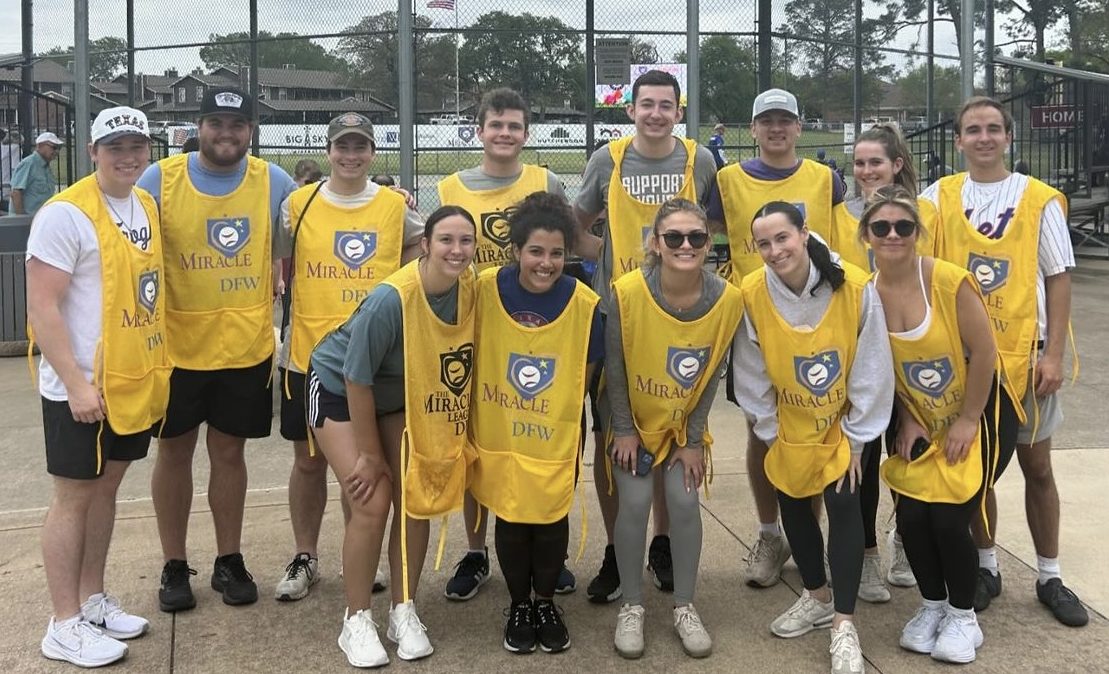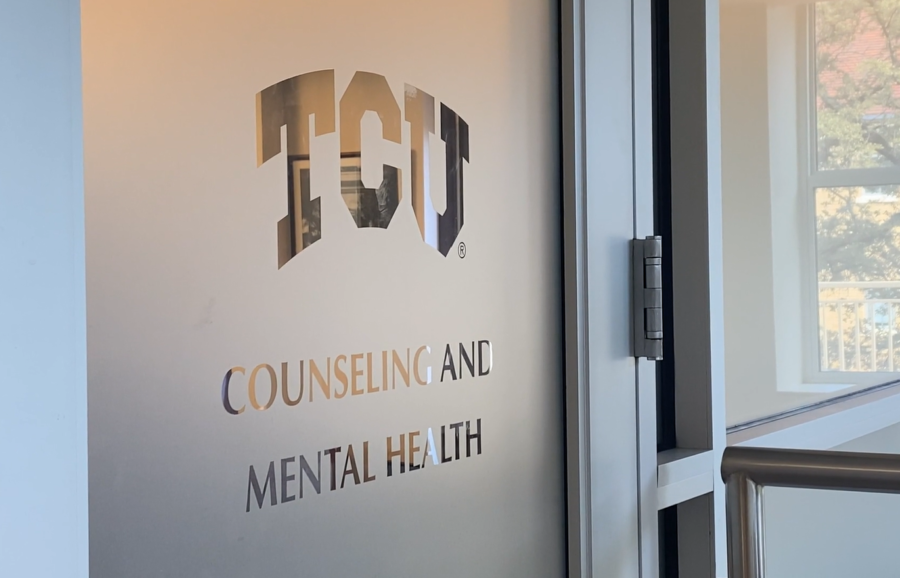In the parking lot behind Amon G. Carter Stadium, TCU Dining Services staff had wheeled out aluminum trays filled with sausages left over from the Saturday football game against Texas.
As she helped load in the food, senior dietetics major Kristen Nyampong worried not all the trays would fit in the backseat of her sedan — but more food to deliver is always better, she said, because “It’s going to people in need.”
Nyampong made her second delivery for the student-led TCU Food Recovery Network on Monday, Oct. 4, dropping off the trays and leftover Einstein Bros. bagels at the Union Gospel Mission of Tarrant County.
This year, FRN volunteers will deliver more than 3,000 pounds of untouched food from campus dining facilities to people facing hunger in Fort Worth.
Every delivery of bagels, meat, rice and pasta, fruit or specialty food from football games makes a difference for the nearly one in five Tarrant County residents who do not know where their next meal is coming from.
“Anything that’s leftover and in good condition, we take!”
Maddie Jacobs, senior dietetics major and TCU Food Recovery Network president
FRN’s mission is two-fold: promoting sustainability and helping the community, said Maddie Jacobs, senior dietetics major and TCU Food Recovery Network president.
FRN recoveries this year will divert 2,500 meals from the landfill. Already, volunteers have delivered more than 800 pounds of food to two organizations that serve those in need, the Union Gospel Mission of Tarrant County and the Northside Inter-Community Agency in Fort Worth.
A new perspective
FRN volunteers said the experience of delivering food opened their eyes to the reality of hunger in the Fort Worth community.
“When I actually went on the deliveries, you can see it like visibly: the people you’re handing the food to, the people you’re helping in the communities,” said Jacobs.
Sophomore nutrition major and regular FRN volunteer Alexandra de Ghenghi witnessed the quiet devastation of food insecurity firsthand while working at a food bank near her home in New York.
“There’s a little girl at the food bank over the summer that I was working with and someone had donated a bunch of Pop-Tarts,” said de Ghenghi. “We handed [them] to her, and it was like she had gotten the best Christmas gift in the whole entire world[…] It just hit me so hard.”
De Ghenghi vowed to take action against food insecurity when she returned to campus in the fall.
Alexandra de Ghenghi, right, and junior dietetics major Brenna Wolfskill volunteer on Sept. 17, 2021 to deliver food to Union Gospel Mission. (Photo courtesy @tcu.foodrecovery Instagram)
In Fort Worth, she delivers food every Friday from Market Square to Union Gospel Mission on East Lancaster Avenue off Interstate 35. Many of Tarrant County’s 1,200 homeless people live out of bags, tents and broken-down cars near underpasses and abandoned fields in the area, nine minutes from TCU’s campus.
“Just driving through that area… you can just see the copious amounts of homeless people,” said de Ghenghi. “It really is them who are having such issues because of course they don’t have that income, they don’t have a home, they don’t have kitchens to cook all their food, so really Union Gospel Mission is their only option.”
Union Gospel provides hot meals and sack lunches to people who are homeless, three meals a day, 365 days a year. In 2019, the agency served more than 230,000 meals.
FRN partnered with Union Gospel because the agency can accept the food no matter the amount and immediately distribute it so none goes to waste.
Week by week, FRN can deliver anywhere from 100 to 1,500 pounds of food, said Robert Clethen, food services director at Union Gospel.
Students deliver the highest volume on the Mondays after football games, when TCU Dining Services recovers untouched food from athlete dining areas and gameday suites.
Jacobs said she hopes students who participate with FRN learn their actions make a difference for people in the Fort Worth community.
“Initially, it’s kind of heartbreaking, like to see the people that you’re helping and the communities that they live in. You don’t realize how close it is to home until you actually do it, and you’re driving five minutes away to drop off the food,” said Jacobs. “But then after a while, you start to see just how important it is just taking that hour out of your week to do something that is so easy for us but makes such a huge impact in the community.”
Deliveries paused during COVID-19
Last year, campus and local COVID-19 restrictions ground FRN deliveries to a halt in the midst of a hunger crisis across the state.
Between April 2020 and April 2021, weekly food insecurity remained at or above 24.8%, where one in four households in Texas lacked resources to adequate food and proper nutrition.
As of last month, 21.9% of households in Texas are still experiencing food insecurity, according to data from the U.S. Census Household Pulse Survey.

“It was kind of a double hit because we were reducing the amount of food we were delivering, and there [were] more people who needed food,” said Jacobs.
Volunteers made just five deliveries in spring 2021.
While deliveries were paused, FRN student officers kept members engaged with the organization’s first-ever guest speaker series, featuring appearances from Union Gospel, food recovery nonprofits and sustainable chef Joel Gamoran.
Jacobs, the then vice president of FRN, organized the events to inform students about issues related to food insecurity and malnutrition and different volunteer opportunities.
“This issue is global — it’s across our country, it’s everywhere, so I think getting those organizations from all around the country was kind of impactful for our members,” said Jacobs.
Read more: TCU’s Food Recovery Network is unable to deliver food amid COVID-19
FRN members also organized a plasticware drive to provide utensils for boxed meals handed out at Union Gospel, said Gina Hill, an associate professor of nutrition at TCU and the faculty advisor for FRN.
Even though students adapted to serving in new ways during the pandemic, Hill said not being able to make deliveries took a toll.
“It was a hard year for FRN because really our drive and our purpose is to obtain that food, recover that food and get it to people who need it,” she said.
This fall marks the first time since the start of the pandemic that volunteers could resume deliveries on Mondays, Wednesdays and Fridays each week.
Sodexo General Manager of TCU Dining Services Scott Majestic said the dining team is thrilled to have recoveries back this semester.
“We’re up and going again, and we’re super happy for that,” he said.
A double-edged sword: food waste at TCU
TCU’s Food Recovery Network delivers untouched food from campus dining facilities, but food that students take but do not eat cannot be recovered.
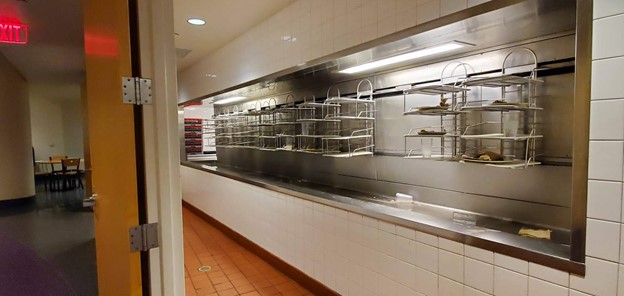
In 2017, Hill found students tossed about 1,270 pounds of breakfast food from Market Square in just ten days — enough to provide more than 1,000 meals for people in need.
“That’s a place where most people can make a big improvement — just being mindful about how much they’re putting on their plates and being realistic about how much they’re going to eat,” said Hill. “It’s a big shame for food that’s perfectly usable to just be thrown away.”
Worldwide, the edible food wasted each year would be enough to provide food for 2 billion people – more than twice the number of undernourished people across the globe, according to the U.N. Food and Agriculture Organization.
The average American sends more than a pound of food to the landfill every day.
Read more: How students can prevent food waste
Hill hopes students who take part in FRN learn why it is important to watch their waste.
“It’s really easy to forget when we have food around us all the time… We want people to feel food is valuable,” she said.
Majestic encouraged students to reduce their waste by not taking too much food at one time.
“Come back for seconds, come back for thirds, come back for fourths — it’s fine. Just take what you can consume,” he said.
Next steps in stopping hunger
This year, FRN will combine approaches from previous years to serve the community.
The organization will offer opportunities for students to deliver and serve food in addition to continuing the guest speaker series that proved popular with volunteers during the pandemic, said Jacobs.
Jacobs also seeks to diversify FRN’s student membership.
“In the past, our club has been largely comprised of nutrition majors because of the nature of the work… but also because that was kind of our target audience in the past,” she said. “We really wanted to reach out to others like sustainability organizations and anyone who is looking to make a difference in the community.”
Jacobs encouraged students of all majors, backgrounds and experience levels to join the TCU Food Recovery Network through TCU Engage.
For those looking for more ways to get involved, here’s how the TCU community can take steps to reduce hunger in Fort Worth.
Volunteer
- Hill encouraged students passionate about food to join the Tarrant County Food Policy Council, which includes working groups that discuss topics such as community gardening, food recovery and urban agriculture. She cochairs the Food Recovery Working Group: “Our efforts are really to try to reduce food waste in the county,” Hill said.
- Volunteers can sort donations or prepare food at the Tarrant Area Food Bank distribution center on Cullen Street. “They’re always looking for volunteers, and they have many different types of opportunities too,” said de Ghenghi, who volunteers to cook food for the Mission Kitchen program twice a week.
- Donate wish list items of food, clothing and cleaning supplies to Union Gospel, or help serve meals at the mission. “Students can learn about our program and what we do and help serve the community at the same time,” Clethen said.
Stay informed
- Learn more: Check out the first installment of a three-part series on hunger in Fort Worth by TCU 360 here.
- Take steps to reduce food waste with these tips from the U.N. Food and Agriculture Organization.
- Spread the word. Jacobs said some students cannot make the FRN delivery times because of other commitments, but they can still share information about the club with friends. “Anytime that we can raise awareness to our organization or our goals in general is another way that is really helpful,” she said.
De Ghenghi hopes more students will act against food insecurity and hunger in whatever way they can.
“It’s really important to me just because no one should ever be hungry,” she said.



